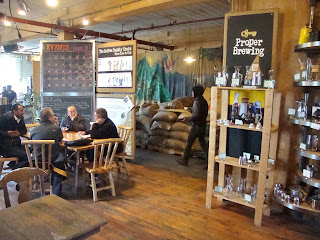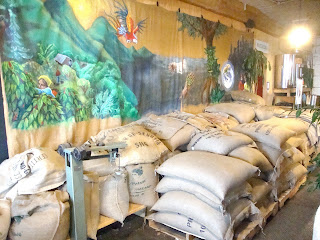“We wanted to open a coffee shop that played kick-ass music and served kick-ass coffee; a shop that we’d want to hang out in ourselves,’ echo Matthew Taylor and Douglas Tiller, partners in Mercury Espresso Bar. It’s a great point and perhaps the real secret to growing their successful Leslieville café even as Starbucks moved in up the street.
No doubt, Starbucks are masters at providing a consistent quality of coffee in a bland, homogeneous, cookie cutter space where everyone feels welcome but nobody feels quite at home, with an exception of course for those people who really feel a connection with bland and homogeneous.
Mercury Espresso Bar is everything that Starbucks isn’t. The baristas are passionate about what they’re doing and know more about coffee than their customers. A lot more… Go figure.
Mathew is a musician and plays in a couple bands, drums and guitar, meaning music is very important around this joint. Beyond a couple house rules which ban playing classical or jazz music or wearing a beret, the baristas play whatever they like. The music is diverse and sometimes loud. It’s definitely not for all of the people all of the time, and this is a very good thing.
Starbucks consistent quality of coffee, doesn’t mean that it’s good. It simply means that it’s dependable, that no matter what country you’re in, or what planet you’re on, there will be a Starbucks, and they will serve you the same cup of coffee. What separates Mercury Espresso Bar from Starbucks more than anything else? It’s that Mercury actually serves great coffee!... even kick-ass coffee. Of late, this is thanks to an important figure behind the rise of the specialty coffee movement, George Howell.
After drinking a lot of Peet’s Coffee in Berkley California back in the late ‘60s Howell moved to Boston where he has described the coffee he found as ‘vile,’ and set about to change things. Some 20 years later, in 1994, Howell sold out his Boston area chain ‘Coffee Connection’ to Starbucks for a ton of Starbuck’s stock. (Worth about ½ billion today!)
Extensive travel throughout the coffee growing regions, including working with the United Nations on sustainability issues, eventually led Howell to help found ‘Cup Of Excellence,’ an important series of competitions that sees farmers growing the best coffee, receive maximum remuneration for their efforts.
Today, Howell is back in the roasting business with his Terroir Coffee Company. No fan of ‘Charbucks,’ Howell focuses much of his time on light roasts and Single Origin beans: single origin, as in from one area or maybe even one farm but not blended with beans from another area or country. As of last November Mercury began testing out Howell’s coffee and now brew it exclusively. Beans are delivered fresh weekly from Howell’s roasting facility just outside of Boston.
The espresso currently being served at Mercury is called Alchemy and is a seasonal Costa Rican, Brazilian blend along with a single origin from El Salvador. (I’m told an Ethiopian, Yirgacheffe is also coming soon!)
The daily brew is currently from Burudi. If you have a little extra time on your hands one afternoon, treat yourself to a Chemex or Siphon pour. It costs a little more, but not more than say, a glass of wine. For coffee lovers the Chemex cuts bitterness while enhancing flavor. The Burundi I drank, black, was clean, lightly sweet and delicious. I’d also recommend the Chemex as an excellent brewing method for anyone trying to kick the milk and sugar habit.
While I would drive across town to try a cup of Howell’s coffee, my ideal shop would also provide options for locally roasted coffee, and there are many great choices available. But that’s just me and Mathew and Douglas are clear in their understanding that you can’t please everyone. As one of the first excellent, and longest standing neighborhood joints on the now thriving Queen East café strip, who’s to argue.
Scones and cookies are from Circles and Squares. Croissants are from Le Matine…
Mon.-Fri. 6:30 a.m.- 8:00 p.m., Sat. – 7-8, and Sun. 8-8





































